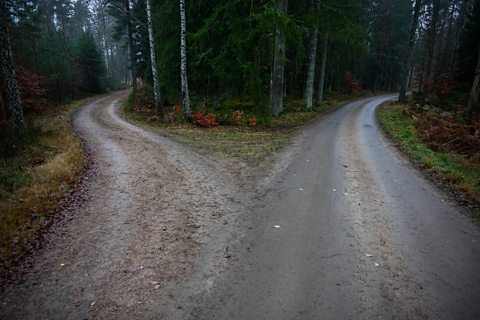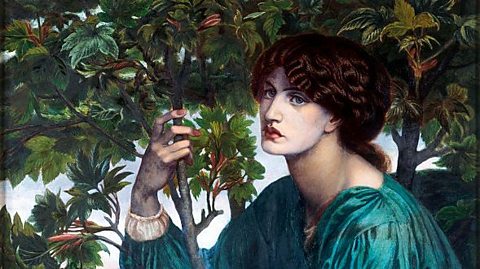Have you ever compared someone to a summerâs day? Then youâre a poet and you didnât know it!
When it comes to poetry, weâre quick to say we donât know a lot simply because we canât recite all of Shakespeareâs sonnets by heart. But we bet youâve been quoting more than Poeâs raven without even realising.
Check out these famous lines from poems you may not realise you knew.

"Come as you are"
This is something you say when youâre having an informal get-together, and the meaning was the same in a famous poem. The complete line is, âCome as you are, tarry not over your toilet.â, and itâs the beginning of the sixth poem by Rabindranath Tagore in POETRY: A Magazine of Verse, published in 1913. It might get a giggle today, but toilet in the historical sense can mean cosmetics, and âto tarryâ means to delay or stay. It carries the lovely sentiment of simply show up imperfectly and be quick about it; the personâs presence in the world is more important than any dress code.
âTis better to have loved and lost/ Than never to have loved at all.â
You may have heard this line in pop songs and films, but it originated in the poem In Memoriam A.H.H. by Alfred, Lord Tennyson. The poem is about the loss of a beloved friend in life. The poemâs title is in reference to Arthur Henry Hallam, who sadly and suddenly died when both men were at university. It took Tennyson 17 years to finish and eventually publish, in 1850 â but as the line dictates, the good memories remain.
âHow do I love thee?/ Let me count the ways.â
Quite possibly one of the most well-known poem openings ever, it comes from Elizabeth Barrattâs How Do I Love Thee? (Sonnet 43) published in 1850 as part of Sonnets from the Portuguese. Barratt wrote the sonnet for her husband and fellow poet Robert Browning, expressing how she considered her love for him not only romantic, but spiritual. The other famous line is âI love thee to the level of every dayâs/ Most quiet need, by sun and candlelight.â, meaning love is also an everyday decision, not just made up of grand metaphors and gestures â which wasnât a common sentiment in romantic poetry. This was Barrattâs most renowned poem ever and made her one of the most celebrated poets of the Romantic era.

âSomeone will remember us, even in another time.â
This isnât an Instagram poem, though you may have seen the familiar lines floating around on social media, particularly in LGBTQ+ circles. This paraphrased line is actually a complete poem â or rather, a serendipitously incomplete one. This is Fragment 147 of a poem by Ancient Greek poet and writer Sappho of Lesbos. The commonly translated lines are: âsomeone I say/ will remember us/ even in another timeâ and are thought to be part of a larger poem, but together make up something short and profoundly sweet. Tragically much of Sapphoâs poetry has been lost, but she continues to be celebrated even in fragmented form â so, indeed, we do remember her from another time.

âStill, like dust, Iâll rise.â
Still I Rise is not only Maya Angelouâs most famous poem of many, but itâs also her personal favourite. It was written in 1976 and has been recited by celebrities including Nicki Minaj, Janelle MonĂĄe and Serena Williams to name a few. The poem addresses the oppression of black people as well as promoting the sentiment of overcoming personal adversity, which Angelou did throughout her difficult childhood and adult life. The final lines are âI rise/ I rise/ I rise.â, the mantra of a powerful and defiant narrator.
âNow comes the rather grisly bitâŠâ
Youâll definitely know childrenâs author Roald Dahl for stories such as The BFG, The Twits and Matilda. But have you read many of his poems? He has a collection of over 40, and this line is from The Pig, in which a clever pig realises whatâs in store for him and eats his Farmer to avoid being eaten â thatâs the ârather grisly bitâ! Many people have adopted this phrase into their speech without realising theyâre actually quoting one of the most famous British writers.

âThe road less travelled.â
To take the road less travelled is a phrase meaning you choose the unconventional or unexplored option, but did you know it comes from a popular work by American poet Robert Frost? Inspired by Frostâs Welsh pal Edward Thomas, who was always regretful of his decisions, the poem is called The Road Not Taken, and says: âTwo roads diverged in a wood, and I -/ I took the one less traveled by,/ And that has made all the difference.â Several interpretations have been put forward for this line (and the poem as a whole), but the one that stuck in common language has to do with picking something independently, despite what everyone else is doing.
This article was published in October 2022
Art styles you didn't know you knew
We bet you know more about art than you think you know.

Five operas you might know from pop culture
From World Cups to The Princess Diaries, opera pops up a lot!

Five philosophical concepts you didn't know you knew
Schrödingerâs cat, The Trolley Problem, utilitarianism and more.
